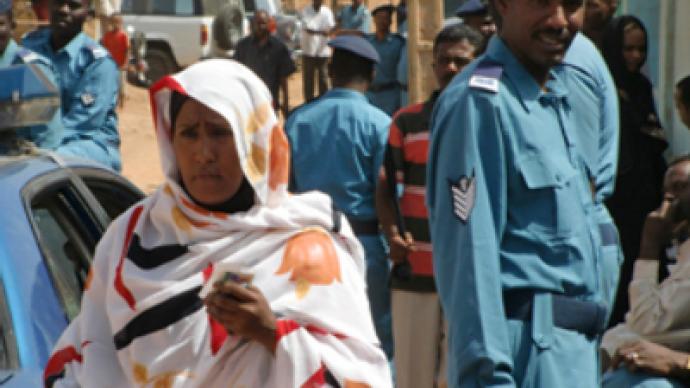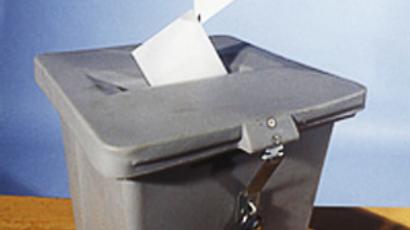Sudanese elections – isle of Tutti

Khartoum, the capital in Sudan, stands at the junction where the Blue Nile and the White Nile merge to form the main river. An island named Tutti, as green as New York’s Central Park, is located in the river’s delta.
A bridge spans the river, leading to the island, so it’s easy to reach Tutti on foot, but not so easy by car.
Tutti is the heart of Khartoum, the very centre of the city. People say that Moses, who is revered by Muslims as well as Christians, made a religious pilgrimage to the island. Tutti, like the rest of Khartoum, is inhabited by both Muslims and Christians. There has never been any conflict between the two religions within Tutti.
The central polling station is situated among picturesque green fields and gardens. The locals obviously take pride in their green island, but observers and UN officials are never taken here: it’s hard to picture these high-ranking people making the long walk in the blazing sun or taking a rickshaw. One can get a good view of the island from the windows of Khartoum’s most luxurious hotel, where all the observers and journalists usually stay. Few ever pause to think that elections are staged in this idyllic spot. University students pointed me towards Tutti. What they said was “if you want to find the perfect voting station – go to Tutti, it’s due north."
A school in the morning. Esteemed-looking old men are sitting along the bright sky-blue fence, mixed with police officers. Children swarm around the queue. Women are lined up opposite. Even when they are angry, the Sudanese sound kind-hearted and dignified. No-one is shouting. The observers – most of them aged, stern-looking women – are carefully watching all the voters. They fix their badges and exchange a few words from time to time, while keeping their eyes fixed on the men, who pace slowly back and forth.
One of the women comes up to me and she is soon joined by the others.
“This is a violation of the law on elections,” she says.
What she means is that it is already 10am and the polling station is still closed.
“A BBC reporter was on TV this morning. He was pointing at his watch and saying that it was already 8:10am and the voting hadn’t started yet. What would he say if he saw this? It’s a disgrace to our country. The lists of voters were mixed up at some of the stations; others didn’t receive their ballots in time. Can you even imagine this happening? Our station was supposed to be opened two hours ago, but the ballots are still not here.”
A woman wearing glasses and a niqab (a veil that covers her face) talks to me. She says she is going to elect the president. She wants the elections to go through like a festive ceremony – orderly and solemn.
“Do you understand how important it is for us that elections go through in accordance with the rules? We are choosing our authorities. After this no one will be able to say our government is illegitimate.”
Mr. Mukhtar, an oppositionist, is standing by the school entrance like a symbol of denouncement. At first glance, one might think Mr. Mukhtar – a tall old man wearing a white imamah and a shirt that falls down to his feet – is a fundamentalist. In fact, Mr. Mukhtar is a democrat. He is not just angry, he is outraged. He spends thirty minutes explaining to a group of young men who have failed to deliver the ballots in time the scale of their failure. The young men listen patiently. This, obviously, does not speed up the station’s opening. I fail to comprehend how a truck could get here – the whole street is flooded with voters.
Finally, packs with ballots are unloaded, and the ballot station is opening its doors. Men and women are lining up in two queues. And the first happy voter on Tutti – a girl – is going out from a ballot booth with a green point finger. Her name is Nakhid, she is on the staff of the Counting board. She feels like a hero and is beaming with happiness.
Different people live on Tutti, including those very well-known in Sudan. In particular, the famous Ferdus Hassan Ahmad, a deputy of the National Assembly has come to cast her vote.
The election will last for three days in 26 country states. There are 16.5 million voters in the country. The right to vote is afforded to those residents who have lived in this area for more than three months and are included on the list of voters. The polls will also be held in refugee camps.The polls are being held to elect a president, 425 members of the parliament, governors of states and local parliamentarians. Separate voting is scheduled for female candidates.
The opposition demanded the election be put off. The Umma Party and Communists are boycotting the election.
There are 12 candidates for the presidential post; however six contenders removed their candidatures at the last moment.
Female observes are taking care of me. They also want to vote, but nobody gets the priority – neither police officers, nor observers. Everyone is waiting for their turn. From time to time we are go under a sun-awning to cool down – chairs are there. It is kind of a woman’s way to put things in order in a man’s world. They decide what to do so that I can get inside the ballot station as the only foreign reporter. It is a difficult task – there is a thick crowd at the entrance.
After a short talk through the window, people step aside and let me go – and not a single person touches me. Such discipline of Muslim societies is amazing – it manifests itself pretty often, but remains unnoticed by the Western eye.
When I am moving, people are greeting me as one who symbolizes that they will be heard and understood around the world.
Everyone on the island knows each other, but there’s no indulgence: they look for the name of every person, mark it and hand out eight enormous ballots to everyone. People go to a booth with these ballots, then roll them up thoroughly and put them into ballot boxes. There are observers on behalf of the parties sitting at the walls – a very strict and picky audience.
Every voter takes at least five minutes. Now it’s clear, why they allotted three days for the election – it’s very hard to cope in one day.
Shadiya, a teacher of English, has been working at school for 30 years now. She is 56. She has two daughters and three sons. She is also an observer at the election. She has taught most of the voters. She is telling us that there used to be foreign language lessons every day, while now there are only three lessons a week. That’s why education standards have fallen down. But she is voting for al Bashir, despite the fact that it was he who simplified the school curriculum.
“He is the only one I trust. I see that roads are being built, that there is electricity, and that schools and hospitals work. We see what is going on in other countries, and we make a comparison with what we have here,” she says.
When talking to me, she is reproaching lazy students for not learning the language properly, as they cannot speak the language. She is interpreting our conversation to everyone who is nearby. Female teachers are gathering around us. Here is a teacher of Islam, here is a teacher of literature, and a teacher of mathematics. Teachers are allowed to come to school only in the full hijab garment – a dress covering everything except for a face and hands. In the senior school boys and girls are schooled separately. Just like in the best schools of Great Britain.
The husband of the teacher of Islam studied in Russia. He got married after having graduated, so she only heard him talk about Russia and saw his pictures.
Shadiya shows me her ID: there is information about her profession, the name of her parents and her fingerprint on it. Others are also showing their IDs – globalization is not that scary in Sudan, at least there’s no sign of consistency in the documents.
In the meantime, observers and police women have been brought some food. Shadiya feels disappointed that women at other tables start eating before treating the guest, meaning me:
"What’s going on with people? Back to the famine, a last piece of food was shared with a guest. Nobody is hungry now, but people eat in a rush without proper respect."
By the way, the food is supplied only for women. “Men can go home as it’s nearby," Shadiya is laughing. However, all comers remain in the place.
Besides this contingent, 20,278 observers from 130 Sudanese organizations are following the polls. There are 14,000 electoral commissions in the country; some of them monitoring two polling stations.
In the evening, I had a meeting with Russian observers. Chechen Senator Aslambeck Aslakhanov, who had visited eight polling stations, said that he was impressed with great enthusiasm of the voters and that there were so many illiterate youngsters. He made a note that “the gregarious instinct” was not the case there; that a son could vote independently from his father's opinion. It’s an important remark, which a Western observer would never make, while a Chechen and a Muslim noticed. He also took note of the fact that 25 per cent of the parliamentary seats were given to women, and the people who he talked to could clearly explain their political choice:
“There are illiterate people, but their civic conscience is really significant: no aggression, no resentment, people patiently stand in line for many hours. The election materials are very well arranged – people can see portraits in a list of candidates. The campaign is well organized, taking into consideration that it is the first multi-party election for all levels of power in 24 years.”
An observer from the Russian Central Election Commission Siyabshakh Shapiev, a Dagestani and a lawyer, paid attention that the legislative side was also well defined:
“There is already a definite date for a second round of presidential election, in case it is necessary”.
Nadezhda Kevorkova for RT, Khartoum













